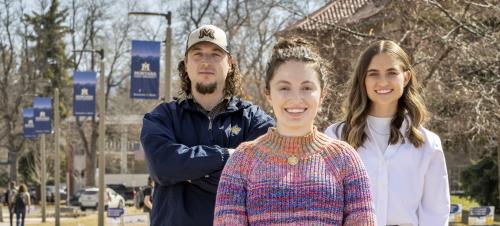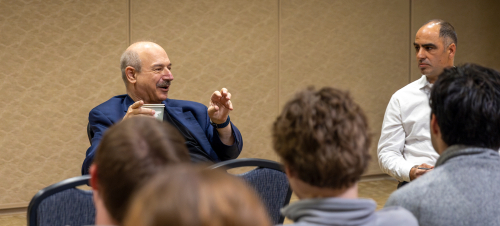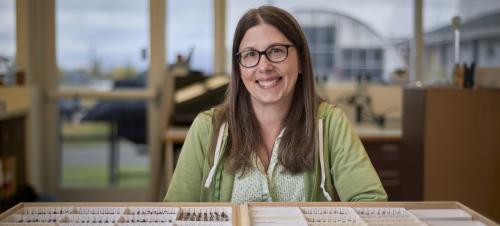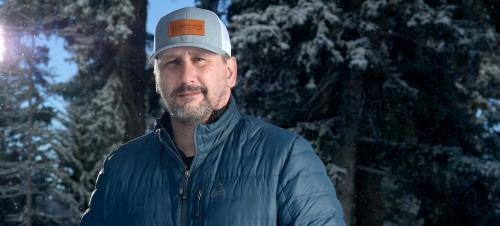Integrating Teaching, Discovery and Outreach
‘A pathway forward’: Montana State hosts inaugural Indigenous student research celebration
By Reagan Cotton, MSU News Service
April 17, 2024
In Montana State University’s Inspiration Hall, the theme of the day was connection and relationship at a new event, hosted April 10-12, which organizers hope will be the first of many iterations.
The Convening of Indigenous Student Researchers came together as the result of collaboration between not only departments and colleges at MSU but also institutions across the state, with all seven of Montana’s Tribal colleges involved in planning. Organizers said the event fulfilled its purpose: to provide a welcoming, open and encouraging space for Indigenous students to share research and relationships.
“In order to be an ally, a supporter, to our Native students, you have to know them as individuals first. Building up that relationality helps them to go further in research,” said Brad Hall, president of Blackfeet Community College in Browning and one of the event’s organizers. “These are our future faculty members, our future professional practitioners, our future cultural leaders, who are really going to help meld all that together in ways that make sense for our communities.”
The event included two plenary speakers – John B. Herrington, Ph.D. CDR, USN (Ret) Astronaut, STS-113, who was the first enrolled member of a Native American tribe to go to space; and Lisa Lone Fight, the founding director of the Mandan, Hidatsa and Arikara Nation’s Department of Science, Technology and Research. A resource fair drew more than two dozen organizations and offices aimed at supporting Indigenous students through higher education and beyond. A highlight of the day was a poster session at which students could present their work.
Read more about the Convening of Indigenous Student Researchers here.

Montana State sends 17 student researchers to premier national conference
By Reagan Cotton, MSU News Service
April 4, 2024
Montana State University sent 17 students to one of the country’s premier celebrations of undergraduate research, where they had the opportunity to present the research they have done in departments across the university.
The National Conference on Undergraduate Research, or NCUR, was held April 8-10 in Long Beach, California, and featured undergraduate researchers from institutions nationwide.
“MSU has long valued undergraduate research, but prioritizing opportunities for undergraduates to participate in research is now part of the university’s strategic plan,” said Anna Tuttle, interim director of MSU’s Undergraduate Scholars Program. “These students have created this opportunity through their own motivation and work, and they made it through a rigorous application process to present at NCUR. The chance to do the research in the first place is made possible by their mentors, and we at the USP are delighted to support their trip to Long Beach.”
Wes Cousin, McKenna Quirk and Zoe Seaford represented the Department of Microbiology and Cell Biology. While all conducting research in the same department, Cousin, Quirk and Seaford work in different fields of microbiology. Cousin works alongside Mari Eggers, whose research focuses on environmental health and water quality; Quirk is a pre-veterinary student working in the lab of Diane Bimczok studying bacterial infections in sheep; and Seaford conducts research with Ed Schmidt, examining the metabolic pathways that help the body process sulfur – research that has possible future applications for cancer treatment.
Read more about MSU's NCUR students here.

Nobel Prize winning geneticist Bruce Beutler visits Montana State
Dr. Bruce Beutler, winner of a 2011 Nobel Prize, highlighted the importance of curiosity and access to research opportunities as he visited Montana State University to give a public talk and meet with students and faculty.
Beutler won the Nobel in the physiology or medicine category for his research on innate immunity — the mechanisms through which the human body identifies an infection and activates an immune response. After initially practicing medicine, Beutler shifted his focus to research. He currently serves as the director of the Center for the Genetics of Host Defense at the University of Texas Southwestern Medical Center in Dallas.
During his daylong visit to MSU, Beutler delivered the Maurice Hilleman Distinguished Lecture, hosted by the College of Agriculture’s Department of Microbiology and Cell Biology. He spoke to a full house in MSU’s Procrastinator Theater, highlighting his current research, which focuses on the application of genetic phenotyping in treating various cancers.
“The Hilleman lecture provided an extraordinary opportunity to meet and listen to Dr. Beutler,” said Sreekala Bajwa, MSU vice president for agriculture and dean of the college. “His lecture was inspiring and educational. I thank Blake Wiedenheft and the Department of Microbiology and Cell Biology for creating this opportunity for the campus community to listen to a world-renowned researcher.”
Read more about Bruce Beutler's visit to MSU here.

Montana State University researcher Casey Delphia published two papers formalizing the first known sightings of two species of wild bees previously not found in Montana. MSU photo by Colter Peterson.
First Montana sightings of two bee species documented by Montana State researcher
By Reagan Cotton, MSU News Service
November 28, 2023
Casey Delphia found two bees that had never been seen in Montana before — right in her backyard.
Delphia, an assistant research professor in the Department of Plant Sciences and Plant Pathology in MSU’s College of Agriculture, has found that her own garden is often an excellent place to find pollinators. In 2021, she managed to catch a small, skinny black bee that looked unfamiliar.
“I brought it inside and looked at it under the microscope. It had some characteristics that reminded me of one genus, but other characteristics that reminded me of another genus,” said Delphia. “So, what the heck is this?”
Consultation of existing taxonomic literature about bee species in the U.S. showed that the bee came from the genus Chelostoma, a type of bee that nests in cavities such as plant stems or holes in trees. But only one species of Chelostoma bee was known to live in Montana, and this one clearly didn’t match.
The newcomer to Delphia’s garden was ultimately identified as Chelostoma campanularum, a non-native species introduced to eastern North America from Europe and only known as far west as Michigan. The first sighting of Chelostoma campanularum and a related species, Chelostoma rapunculi, another European species only known as far west as Illinois, were documented in a paper by Delphia that appeared in The Pan-Pacific Entomologist.
Read more about Casey Delphia's work here.

Lance McNew, associate professor in the Department of Animal and Range Sciences at Montana State University's College of Agriculture. MSU photo by Colter Peterson.
Montana State professor publishes book on wildlife ecology
By Reagan Cotton, MSU News Service
October 6, 2023
A new, first-of-its-kind book on rangeland wildlife ecology in the American West was published last month, edited by an associate professor in Montana State University’s College of Agriculture.
Lance McNew of the Department of Animal and Range Sciences was lead editor of the book “Rangeland Wildlife Ecology and Conservation,” which is available online via open access publication. Hard copies are available from conventional booksellers. Co-editors were David Dahlgren of Utah State University and Jeffrey Beck of the University of Wyoming.
The book is the product of more than three years of collaboration and preparation, said McNew.
“There hasn’t been, at least in the last 30 years, any type of comprehensive summary of what we know about rangeland wildlife ecology, despite exponential growth in the science applied to those questions,” said McNew, who has been at MSU since 2014 and conducting wildlife habitat research for more than 20 years. “We were trying to get the things we know synthesized into one place so that researchers who study rangeland systems would have a nice review of what is known, and also to serve as a reference for working wildlife professionals, whether they be wildlife biologists or land managers or private ranchers.”

